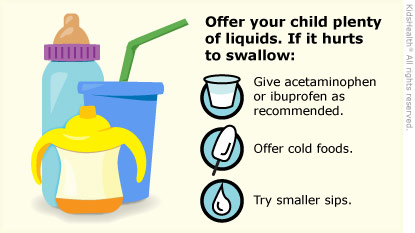Hand, Foot, and Mouth Disease With Dehydration: How to Care for Your Child
Kids with hand, foot, and mouth disease have a virus that causes painful blisters. The blisters may be in the mouth, on the hands and feet, and sometimes on other areas of the skin. During the visit, your child was treated for dehydration with liquids by mouth or through an IV (given into a vein). Medicine for pain may have been given. It's important for your child to continue to drink plenty of liquids at home.


-
If your health care provider says it's OK, you can give medicine for fever or mouth pain. Use these medicines exactly as directed:
-
acetaminophen (such as Tylenol® or a store brand)
-
OR
-
ibuprofen (such as Advil®, Motrin®, or a store brand). Don't give ibuprofen to babies under 6 months old.
-
Don't give aspirin to your child. It could lead to a serious medical problem called Reye syndrome.
-
To prevent dehydration, offer plenty of water, ice pops, or cold milk. Hot drinks, sodas, and acidic food (citrus juice, tomato sauce, etc.) can make the pain worse.
-
Let your child rest as needed.
-
Wash blisters on the skin with soap and lukewarm water. Pat dry and leave them uncovered. Use a fresh towel or paper towel each time.

Your child:
-
refuses to drink or doesn't want to swallow
-
is vomiting and can't keep liquids down
-
doesn't improve after 2 days
-
appears dehydrated again; signs include:

Your child:

Could dehydration happen again? Dehydration is when a person does not have enough fluids in their body. A child who was treated for dehydration can get dehydrated again. To prevent this, it's very important to keep giving liquids.
Can hand, foot, and mouth disease spread to others? Yes. Hand, foot, and mouth disease is caused by a virus called coxsackievirus. It is contagious and can easily spread from one person to another through mucus, saliva (spit), fluid from the blisters, or poop.
Hand, foot, and mouth disease is common in young children and can spread quickly through child care centers or schools. Sometimes adults can get the infection from a child. Children who have blisters should not return to child care or school until the blisters have healed.
How can someone avoid spreading the infection? All family members and child care providers should wash their hands well and often, especially after changing diapers. Use soap and warm water, scrub for at least 20 seconds, rinse, and dry thoroughly. If soap and water are not available, a hand sanitizer with at least 60% alcohol can be used. Clean tabletops, doorknobs, toys, and other hard surfaces with a cleaner that kills viruses.
Teach older children to wash their hands and cover their noses and mouths when coughing or sneezing. Children should not share cups and utensils.
Do antibiotics help treat hand, foot, and mouth disease? A virus (not bacteria) causes hand, foot, and mouth disease, so antibiotics won't make it go away. With pain medicines and plenty of liquids, most kids feel better in less than a week.